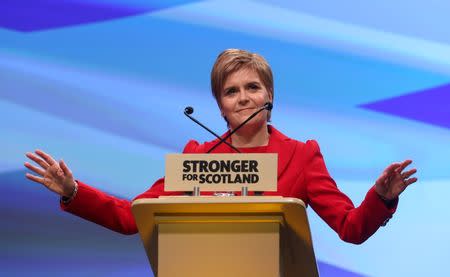Better economic arguments needed to sway Scots on independence, say Greens
By Elisabeth O'Leary EDINBURGH (Reuters) - More work to nail the economic arguments is needed if Scotland wants to split from the United Kingdom, regardless of the outcome of next month's in-out European Union referendum, the head of the pro-independence Scottish Greens said. Patrick Harvie's party is the devolved Scottish government's most likely ally in the event of a drive for a new independence referendum, and backed secession in 2014 when Scotland rejected it by 55 to 45 percent. The Greens' six seats at Holyrood would complete the 65 seats for a majority that the SNP, with 63, would need to pass legislation. "Independence would force the Scottish government to be realistic about the finite lifespan of the oil and gas industry. We are squandering the opportunity to do something about it," Harvie told Reuters in an interview. Scotland should also be laying the groundwork for an independent currency, he added. "That Scotland determines fiscal policy but the UK determines currency policy just makes no sense" The Scottish National Party has offered the possibility of another referendum on independence if Scotland votes to stick with the EU on June 23 and Britain as a whole votes out, adding to the potential risks associated with the ballot. All five parties in Scotland's devolved parliament support EU membership, arguing that important trade and political links need to be preserved. Harvie said he does not, however, believe that a scenario in which Britain votes to leave the EU, known as a "Brexit", would in turn boost Scottish support for a split from the UK. "If the UK votes to leave there will be a great deal of appetite for another referendum now, now, now, now," he said. "But that (clamour) will be from those who voted 'yes' in 2014, and I'm not convinced that would do much to persuade the people who saw some attraction but also saw a downside and ended up voting 'no,'" said 43-year-old Harvie, a former gay rights campaigner. The Scottish government under Nicola Sturgeon can do more to further the independence cause by applying a new mindset to its enhanced devolved powers, which now include taxes, he said. "Part of the goal of achieving independence is well served by using the powers we already have in the boldest and most creative way possible, demonstrating by our actions that we are well capable of governing ourselves," he said. The idea that Scotland could still use the pound after independence was one of the main flaws in the 2014 campaign, he said, adding that he expects to be consulted when the SNP start a new independence drive this summer. "We have long argued that Scotland should be laying the groundwork for an independent currency. If you want independence in order to run a different macro-economic policy, you can't do that if you are part of a currency union that sets restraints on levels of borrowing." (Editing by Guy Faulconbridge)



